All good things must come to an end sometime - this is the last of my summer holiday posts in Central/Northern Greece.
"Have you left the lake district?" Hrisida was calling to ask us how the trip to Limni Plastira went.
"I think we saw more than we bargained for," I told her. It was quite getting quite late, but this was mainly our own fault. We could not help pulling over every few minutes or so to take a closer look at something that caught our attention: a strange-looking landscape, an unknown tree species, a field cultivated with an unusual crop. So much seemed quite novel to us here.
"Feel like taking a shortcut?" she asked me. We had decided not to return to Karpenisi along the same route that we had taken to arrive at the lake. We didn't have the energy to take that road again, as it had been quite a tiring journey, winding around all the remote mountain tracks.
"As long as we don't get lost," I replied. Using the main arterial routes is not really much fun; the roads you pass through usually show up the worst of an area. Dust, concrete, and congestion mix together, forming a shanty-town look, creating an ugly image that prejudices your feelings about an area - all the above are necessary evils when you want to drive on auto-pilot.
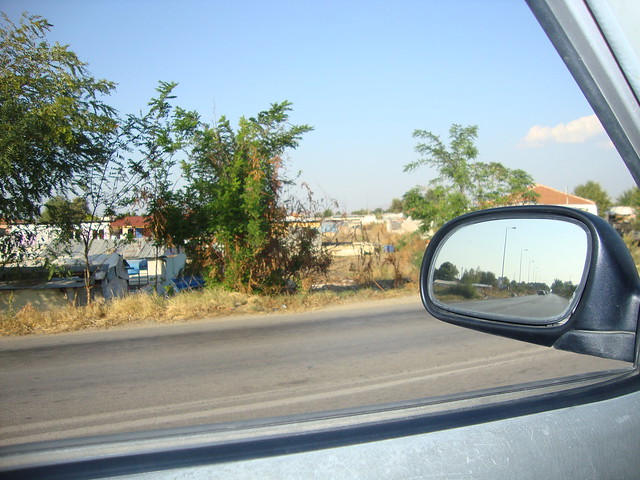
"Take the road towards Lamia," Hrisida explained, "and turn off at Xiniada, then drive on to Makrakomi after you pass Trilofo." These names all had an onomatopoeic ring to them; they conjured up images from the meanings of their stem words. Already, I had put it in my mind that Xiniada must give off a "sour" odor, while Trilofo was surrounded by "three hills", and Makrakomi would feel somewhat "extensive".
"And don't forget to ask for directions," she added as an afterthought, "because not everything is signposted." After today's drive out in the unexplored depths of Evritania, we did not need reminding of this, as we had lived through it quite poignantly. The detour would bring us back on to the main road for Karpenisi and we would save about half an hour's worth of driving. I thanked her for her quick thinking, not because I was worried about driving more kilometers than necessary and wasting expensive fuel*, but because I knew I would be seeing more of the off-the-beaten-tracks of my country, strips of tarmacked road where the chance of meeting up with other drivers was slim. Once again, we found ourselves alone on the roads, and once again, we were not disappointed.
The sky was still bright, but the autumn sun was now darkening the naturally bright colours of the countryside. Orange turned to brown, yellow to ochre, red to brick, olive to bottle green. The turnoff at Xiniada took us into a large flat valley surrounded by fields and low-lying hills, all showing signs of summer's coming to an end. The grasses by the edge of the road were tinder-dry, while most of the fields were now lying naked, their harvests gathered and their earth turned, in readiness for the next sowing season. Very soon, the rains would start to fall, turning the area into a green carpet.
"Where are we now, Mum?" my son asked. "Are we going to be home soon?" Home in the child's mind is the place where they feel safe. Even though we were hundreds of miles away from home, my son was content to think of home as the hotel room where he had left a few toys on his bedside table. The valley was empty and it did not feel like home. Yet, this place felt like it could have been home; any of those houses tucked away in one of the eerily quiet people-less villages that we came across every now and then could have been our home.
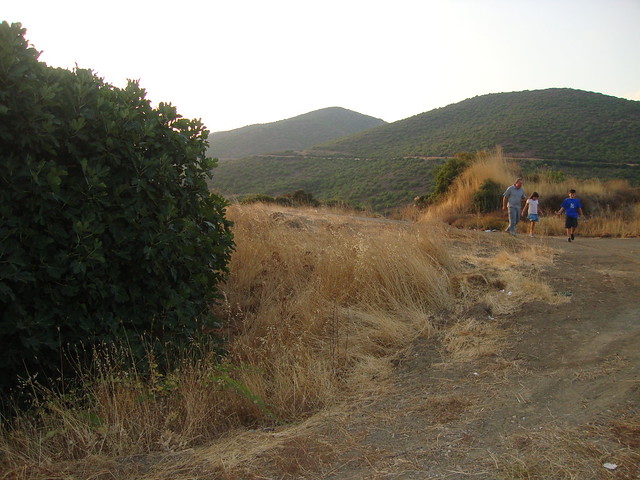
Pit-stop time is usually when someone wants to go the toilet. In the backwaters, this is also known as 'fertilising the fields'. We found a clearance near a fig tree on the roadside from which a dirt path led off behind the hill. The fig tree provided the opportunity to recall a blast from the past. As he led the children down the track, their father told them the story of the fig tree in the village, which provided his own father, then a child, great relief from the hot sun, along with many other children living in the same area.
"Your grandad used to try to get to the top of the tree first, to get the best position, so everyone else had to sit on the lower branches. If the figs were ripe and juicy, he didn't need to climb down to find food or water. I remember he told me one day that he wanted to go the toilet after eating too many, but he knew that if he climbed down, then he wouldn't get to sit in the best place again. So he stayed there and did his pipi from where he was sitting."
"Yuuuuuuuuuuuck," said my daughter, "that sounds disgusting."
"What about the others below him?" asked my son. "Did he pee on them?"
"Yep, both thick and thin**!" their dad laughed. "So he stayed up there the whole day and didn't come down until the late evening, until the coast was clear. He knew he was in for it if he came down earlier." The children weren't laughing; they couldn't see the humour in this. Had they had the chance to meet their grandad, they might have sided with him. they might have even heard the story straight from him.
"Is that tree still in the field, Dad?" Maybe my son was wondering if he would find any fossilised remains of a previous round of fertilisation.
"No, no...," their father's voice trailed off. "You see... I cut it down when your grandfather was still alive, well before you were born, because I felt the orange trees surrounding it weren't getting enough sunlight. The fig tree was so tall that it was suffocating the other trees. Dad didn't talk to me for a week after that. It was his favorite tree, you see."
Nostalgia was beginning to bite.
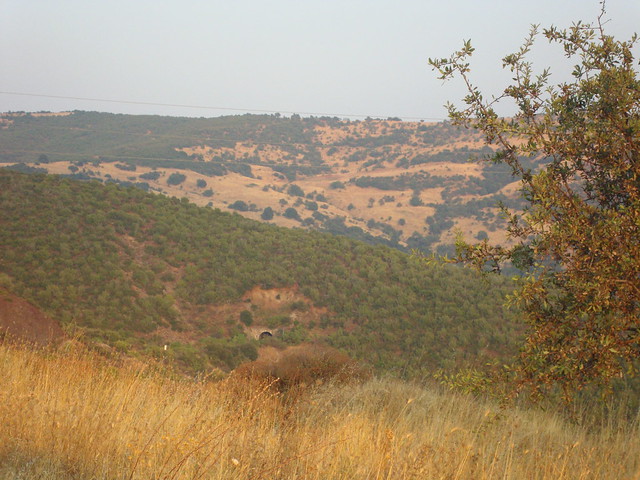
"Is that a cave?" I pointed out something in the far distance to the children, something I wish they had seen themselves before I spotted it, just to give me the confidence to believe that they were developing good observational skills, something lacking in the instant gratification culture that the second millennium generation is growing up in.
"It's a bridge," they both agreed.
"How can you be so sure?" I pushed them harder.
"It looks like a tunnel," said one. Whatever it was, we did not have time to explore it, but it looked quite interesting, like a secret passage leading to another side of this unknown territory, a memory of a bygone era.
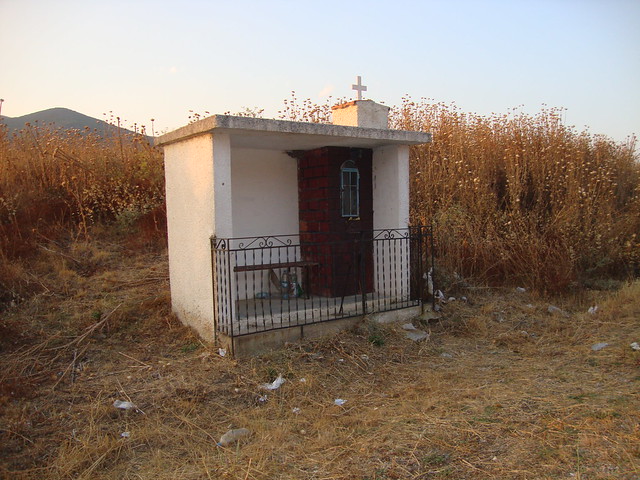
The iconostasis is a common sight on Greek roads, a reminder of danger, as it nearly always involves a road accident. These boxes are usually built on the side of the road, close to where the accident took place, and dedicated to a saint, after the name of a person who died at the scene. In Central Greece, they get much bigger than a box - some are as big as bus shelters, looking as though they do both jobs. There is usually an icon - or more, according to the size of the iconostasis - with some old brown roses (looking very much dead) hanging over the icon, often accompanied by an unlit oil lamp, and a few filthy old plastic water bottles filled with rancid oil. It provides a desolate view for the passersby. The wick in the old glass sits on a sticky mass of grease, often unlit. This comes as no surprise to the traveller to these areas, who will often find himself alone on the road: who is there to pass by frequently from these parts to keep the lamp burning?
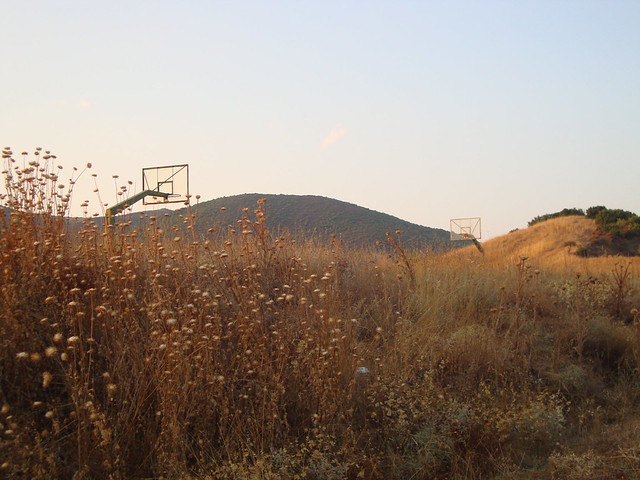
The desolation reaches a climax as the same road where the iconostasis is found also includes a sign denoting the existence of a school. The sign had rusted over time, and was never replaced, no doubt because it was forgotten, after the school had closed down, and the children had grown up and left the area before they had their own children. The basketball court is barely visible from the tall dry grasses smothering the playground, their baskets protruding like triffids lying in wait, having turned into feral cats after living in isolation for so long.
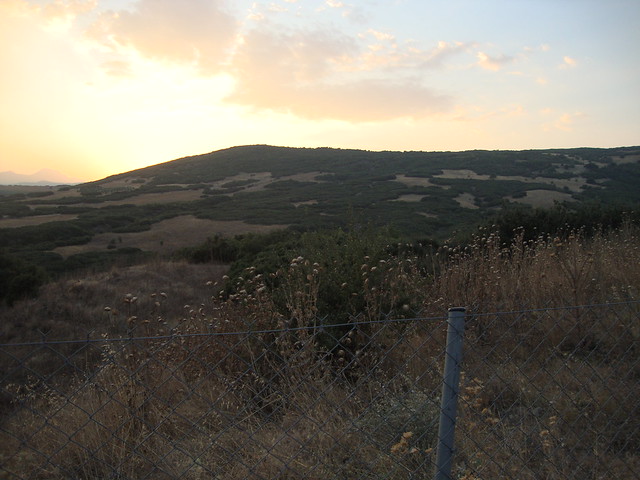
The sun was setting and it would soon be dark. The landscape took on a lunar look: round patches like crop circles dotted the surrounding hills of the countryside, which was showing signs of hair loss on a balding middle-aged man. The sight eventually gave way to a fertile plain, patch-worked with fields in varying shades of green and brown. The horizon stretched out for miles, where a misty view of a mountain seemed to rise to the sky. The mountains of Greece mark the farmer's boundaries, setting natural limits to the agricultural production capabilities; they are both a curse and a blessing.
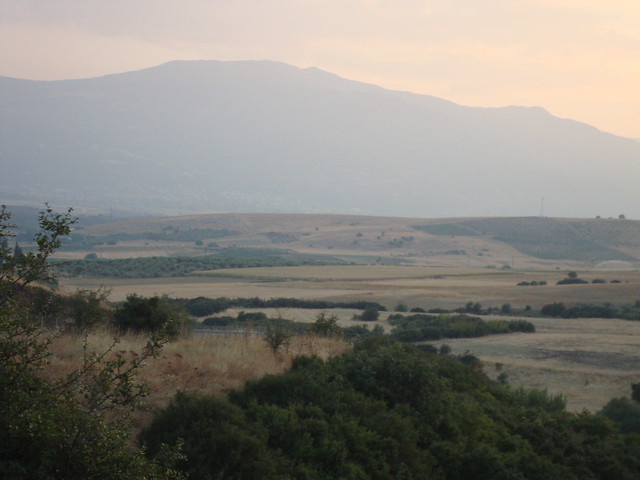
The scenery was changing again. We came across a recently excavated region, where the ravaged hills had a stark brown look. Parts of them were missing, so that they resembled half-eaten apples, scraped away to their core, and left to rot. Mining dust had covered the grasses and surrounding vegetation, choking any hint of verdant foliage out of them. The road looked as though it was under construction. The noise of machinery could be heard coming from a work site. A prefab building stood at the entrance, filled with lorry trailers and bordered by iron railings. A man was standing outside the prefab, our first human sighting since we left the main road at Xiniada.
"Are we heading the right way for Makrakomi?" we asked him, remembering Hrisida's words. He looked tired, as workers do at the end of a long working day in the hot Greek summer, when they have been over-exposed to the elements, with no refuge available to offer a shady respite. He was wearing a cap that covered his head to just above his eyebrows which were thick and white, making it hard to tell if they were covered in dust or if he had simply aged prematurely.
"Yes, yes" he said, showing signs of hesitation in his voice. "It really isn't far from here, it's just...," he pointed to the distance with one hand, shading his eyes over his forehead with the other. He continued to explain that the area was signposted and we should find it easily.
"Thank you," I said, putting the motor into first gear. But the man continued to talk, reassuring us that we wouldn't get lost, trying his hardest to make us feel comfortable on this desolate strip of road. Not that there was any other road to take; this was the only one that was tarmacked. We let him continue talking; it only felt right to talk to the locals as we spotted them, since there were not so many, and they seemed to need the company. But maybe they did not really care for it anyway, maybe they liked being alone out here, away from the rat race, far from the murmurs of discontent whose wails have been echoing in our minds since the crisis took hold of the nation. What meaning did Athens' cries have here?
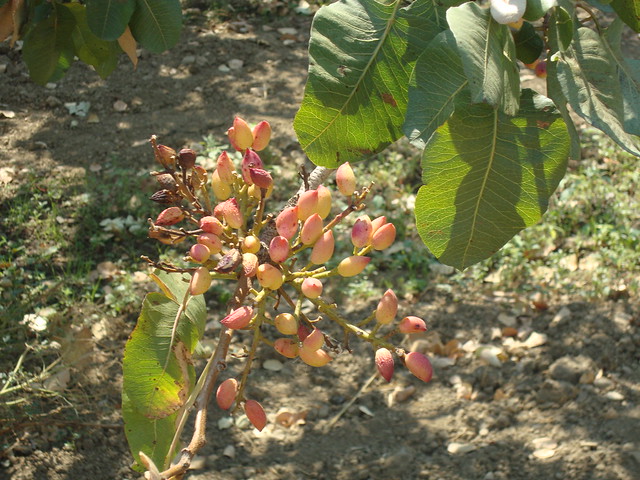
The barren landscape continued to chase us hauntingly as we passed a roundabout junction carved in the middle of the road, all routes coming off it seemingly ending up going in the same direction. The bare earth eventually gave way to a more verdant region with a housing settlement. A non-descript village sprouted out of the soil. This served as a sign that we were nearing a larger town or the main road: inhabited villages are often connected to them. Three old men were sitting out on the plateia of the village, in front of a kafeneio next to the village church. The scene looked like a still life on an artist's canvas, as the men were not talking to each other, just sitting on the plateia's only bench, huddled together, waiting for darkness to fall, after which they would take their walking canes and head back home. Such is the sweet village life of Greece: church, kafeneio and plateia, the mainstays of a community, classic village symbols that have withstood the test of time, and look set to continue with renewed interest when they are taken over by the former urbanites who are now dragging themselves back to their roots, looking for shelter and compassion, away from the ills of unemployment that their adopted environment was now promising them.
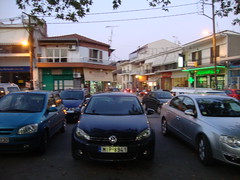
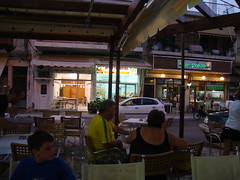
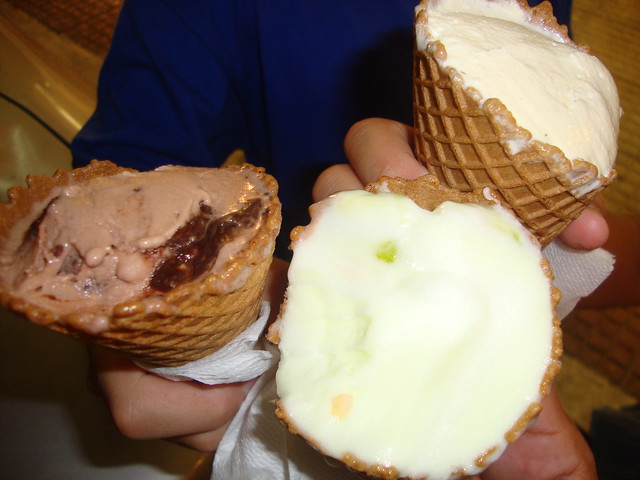
Sure enough, the main road came into view only a few metres away from the village with the still life scene, just as the sun was setting. The scenery had lost its glow, and we now needed to turn on the car lights. We could still discern the pistachio trees lining a roadside plantation, with their fruits hanging like bunches of grapes on the branches. We were approaching Makrakomi, the main town in the area, sandwiched between Lamia and Karpenisi. After so many hours of being isolated from the masses, the sight of the cafes and tavernas mingling with the congestion and rowdiness of a busy town almost felt like a consolation. It reminded us of what we were going back home to.
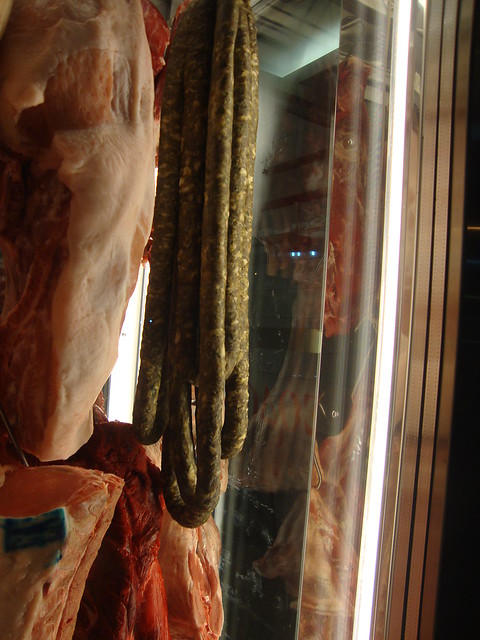
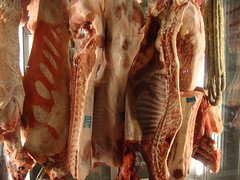
Rural isolation is a thing of the past; nowadays, all roads lead to an urban environment. You're never really alone.
* Throughout our summer road trip in Greece, we were paying an average of €1.70 per litre of petrol - car fuel is expensive all over Greece.
** thin and thick - number 1s and number 2s in pipi language.
©All Rights Reserved/Organically cooked. No part of this blog may be reproduced and/or copied by any means without prior consent from Maria Verivaki.
"Have you left the lake district?" Hrisida was calling to ask us how the trip to Limni Plastira went.
"I think we saw more than we bargained for," I told her. It was quite getting quite late, but this was mainly our own fault. We could not help pulling over every few minutes or so to take a closer look at something that caught our attention: a strange-looking landscape, an unknown tree species, a field cultivated with an unusual crop. So much seemed quite novel to us here.
"Feel like taking a shortcut?" she asked me. We had decided not to return to Karpenisi along the same route that we had taken to arrive at the lake. We didn't have the energy to take that road again, as it had been quite a tiring journey, winding around all the remote mountain tracks.
"As long as we don't get lost," I replied. Using the main arterial routes is not really much fun; the roads you pass through usually show up the worst of an area. Dust, concrete, and congestion mix together, forming a shanty-town look, creating an ugly image that prejudices your feelings about an area - all the above are necessary evils when you want to drive on auto-pilot.

"Take the road towards Lamia," Hrisida explained, "and turn off at Xiniada, then drive on to Makrakomi after you pass Trilofo." These names all had an onomatopoeic ring to them; they conjured up images from the meanings of their stem words. Already, I had put it in my mind that Xiniada must give off a "sour" odor, while Trilofo was surrounded by "three hills", and Makrakomi would feel somewhat "extensive".
"And don't forget to ask for directions," she added as an afterthought, "because not everything is signposted." After today's drive out in the unexplored depths of Evritania, we did not need reminding of this, as we had lived through it quite poignantly. The detour would bring us back on to the main road for Karpenisi and we would save about half an hour's worth of driving. I thanked her for her quick thinking, not because I was worried about driving more kilometers than necessary and wasting expensive fuel*, but because I knew I would be seeing more of the off-the-beaten-tracks of my country, strips of tarmacked road where the chance of meeting up with other drivers was slim. Once again, we found ourselves alone on the roads, and once again, we were not disappointed.
The sky was still bright, but the autumn sun was now darkening the naturally bright colours of the countryside. Orange turned to brown, yellow to ochre, red to brick, olive to bottle green. The turnoff at Xiniada took us into a large flat valley surrounded by fields and low-lying hills, all showing signs of summer's coming to an end. The grasses by the edge of the road were tinder-dry, while most of the fields were now lying naked, their harvests gathered and their earth turned, in readiness for the next sowing season. Very soon, the rains would start to fall, turning the area into a green carpet.
"Where are we now, Mum?" my son asked. "Are we going to be home soon?" Home in the child's mind is the place where they feel safe. Even though we were hundreds of miles away from home, my son was content to think of home as the hotel room where he had left a few toys on his bedside table. The valley was empty and it did not feel like home. Yet, this place felt like it could have been home; any of those houses tucked away in one of the eerily quiet people-less villages that we came across every now and then could have been our home.

Pit-stop time is usually when someone wants to go the toilet. In the backwaters, this is also known as 'fertilising the fields'. We found a clearance near a fig tree on the roadside from which a dirt path led off behind the hill. The fig tree provided the opportunity to recall a blast from the past. As he led the children down the track, their father told them the story of the fig tree in the village, which provided his own father, then a child, great relief from the hot sun, along with many other children living in the same area.
"Your grandad used to try to get to the top of the tree first, to get the best position, so everyone else had to sit on the lower branches. If the figs were ripe and juicy, he didn't need to climb down to find food or water. I remember he told me one day that he wanted to go the toilet after eating too many, but he knew that if he climbed down, then he wouldn't get to sit in the best place again. So he stayed there and did his pipi from where he was sitting."
"Yuuuuuuuuuuuck," said my daughter, "that sounds disgusting."
"What about the others below him?" asked my son. "Did he pee on them?"
"Yep, both thick and thin**!" their dad laughed. "So he stayed up there the whole day and didn't come down until the late evening, until the coast was clear. He knew he was in for it if he came down earlier." The children weren't laughing; they couldn't see the humour in this. Had they had the chance to meet their grandad, they might have sided with him. they might have even heard the story straight from him.
"Is that tree still in the field, Dad?" Maybe my son was wondering if he would find any fossilised remains of a previous round of fertilisation.
"No, no...," their father's voice trailed off. "You see... I cut it down when your grandfather was still alive, well before you were born, because I felt the orange trees surrounding it weren't getting enough sunlight. The fig tree was so tall that it was suffocating the other trees. Dad didn't talk to me for a week after that. It was his favorite tree, you see."
Nostalgia was beginning to bite.

"Is that a cave?" I pointed out something in the far distance to the children, something I wish they had seen themselves before I spotted it, just to give me the confidence to believe that they were developing good observational skills, something lacking in the instant gratification culture that the second millennium generation is growing up in.
"It's a bridge," they both agreed.
"How can you be so sure?" I pushed them harder.
"It looks like a tunnel," said one. Whatever it was, we did not have time to explore it, but it looked quite interesting, like a secret passage leading to another side of this unknown territory, a memory of a bygone era.

The iconostasis is a common sight on Greek roads, a reminder of danger, as it nearly always involves a road accident. These boxes are usually built on the side of the road, close to where the accident took place, and dedicated to a saint, after the name of a person who died at the scene. In Central Greece, they get much bigger than a box - some are as big as bus shelters, looking as though they do both jobs. There is usually an icon - or more, according to the size of the iconostasis - with some old brown roses (looking very much dead) hanging over the icon, often accompanied by an unlit oil lamp, and a few filthy old plastic water bottles filled with rancid oil. It provides a desolate view for the passersby. The wick in the old glass sits on a sticky mass of grease, often unlit. This comes as no surprise to the traveller to these areas, who will often find himself alone on the road: who is there to pass by frequently from these parts to keep the lamp burning?

The desolation reaches a climax as the same road where the iconostasis is found also includes a sign denoting the existence of a school. The sign had rusted over time, and was never replaced, no doubt because it was forgotten, after the school had closed down, and the children had grown up and left the area before they had their own children. The basketball court is barely visible from the tall dry grasses smothering the playground, their baskets protruding like triffids lying in wait, having turned into feral cats after living in isolation for so long.

The sun was setting and it would soon be dark. The landscape took on a lunar look: round patches like crop circles dotted the surrounding hills of the countryside, which was showing signs of hair loss on a balding middle-aged man. The sight eventually gave way to a fertile plain, patch-worked with fields in varying shades of green and brown. The horizon stretched out for miles, where a misty view of a mountain seemed to rise to the sky. The mountains of Greece mark the farmer's boundaries, setting natural limits to the agricultural production capabilities; they are both a curse and a blessing.

The scenery was changing again. We came across a recently excavated region, where the ravaged hills had a stark brown look. Parts of them were missing, so that they resembled half-eaten apples, scraped away to their core, and left to rot. Mining dust had covered the grasses and surrounding vegetation, choking any hint of verdant foliage out of them. The road looked as though it was under construction. The noise of machinery could be heard coming from a work site. A prefab building stood at the entrance, filled with lorry trailers and bordered by iron railings. A man was standing outside the prefab, our first human sighting since we left the main road at Xiniada.
"Are we heading the right way for Makrakomi?" we asked him, remembering Hrisida's words. He looked tired, as workers do at the end of a long working day in the hot Greek summer, when they have been over-exposed to the elements, with no refuge available to offer a shady respite. He was wearing a cap that covered his head to just above his eyebrows which were thick and white, making it hard to tell if they were covered in dust or if he had simply aged prematurely.
"Yes, yes" he said, showing signs of hesitation in his voice. "It really isn't far from here, it's just...," he pointed to the distance with one hand, shading his eyes over his forehead with the other. He continued to explain that the area was signposted and we should find it easily.
"Thank you," I said, putting the motor into first gear. But the man continued to talk, reassuring us that we wouldn't get lost, trying his hardest to make us feel comfortable on this desolate strip of road. Not that there was any other road to take; this was the only one that was tarmacked. We let him continue talking; it only felt right to talk to the locals as we spotted them, since there were not so many, and they seemed to need the company. But maybe they did not really care for it anyway, maybe they liked being alone out here, away from the rat race, far from the murmurs of discontent whose wails have been echoing in our minds since the crisis took hold of the nation. What meaning did Athens' cries have here?

The barren landscape continued to chase us hauntingly as we passed a roundabout junction carved in the middle of the road, all routes coming off it seemingly ending up going in the same direction. The bare earth eventually gave way to a more verdant region with a housing settlement. A non-descript village sprouted out of the soil. This served as a sign that we were nearing a larger town or the main road: inhabited villages are often connected to them. Three old men were sitting out on the plateia of the village, in front of a kafeneio next to the village church. The scene looked like a still life on an artist's canvas, as the men were not talking to each other, just sitting on the plateia's only bench, huddled together, waiting for darkness to fall, after which they would take their walking canes and head back home. Such is the sweet village life of Greece: church, kafeneio and plateia, the mainstays of a community, classic village symbols that have withstood the test of time, and look set to continue with renewed interest when they are taken over by the former urbanites who are now dragging themselves back to their roots, looking for shelter and compassion, away from the ills of unemployment that their adopted environment was now promising them.



Sure enough, the main road came into view only a few metres away from the village with the still life scene, just as the sun was setting. The scenery had lost its glow, and we now needed to turn on the car lights. We could still discern the pistachio trees lining a roadside plantation, with their fruits hanging like bunches of grapes on the branches. We were approaching Makrakomi, the main town in the area, sandwiched between Lamia and Karpenisi. After so many hours of being isolated from the masses, the sight of the cafes and tavernas mingling with the congestion and rowdiness of a busy town almost felt like a consolation. It reminded us of what we were going back home to.


We stopped off at Makrakomi for a souvlaki and an ice-cream, which always tastes great in this part of the country because meat raised in these areas is very tasty. Souvlaki can be filled with any meat of the customer's choice: pork, beef, chicken, meat pattie (bifteki), sausage, kebab (doner) or skewered meat (souvlaki xilaki). The souvlatzidiko was next door to a butcher whose wares were displayed in their unprocessed state in the window. The carcasses are much much larger than what we are used to seeing in Hania.
Rural isolation is a thing of the past; nowadays, all roads lead to an urban environment. You're never really alone.
* Throughout our summer road trip in Greece, we were paying an average of €1.70 per litre of petrol - car fuel is expensive all over Greece.
** thin and thick - number 1s and number 2s in pipi language.
*** *** ***
It hasn't all come to a complete end; now it's time to get back to the kitchen and try some new recipes - autumn has set in for good now, and the best place to be is in the kitchen...©All Rights Reserved/Organically cooked. No part of this blog may be reproduced and/or copied by any means without prior consent from Maria Verivaki.
Πάντα ιδιαίτερες οι αναρτήσεις σου Μαρία! Καλή σου μέρα:)
ReplyDeleteYou've certainly had an adventurous trip! I'm looking forward to your next kitchen experiments. :)
ReplyDelete